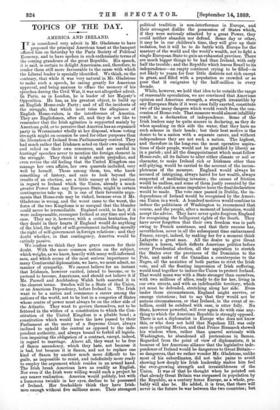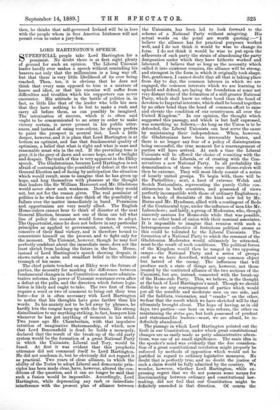TOPICS OF THE DAY.
AMERICA AND IRELAND.
IT is considered very adroit in Mr. Gladstone to have proposed the principal American toast at the banquet offered him on Saturday by the Paris Society of Political Economy, and to have spoken in such enthusiastic terms of the coming grandeurs of the great Republic. His speech, it is said, is certain to delight Americans, and, therefore, to render them still more favourable to the cause with which the Liberal leader is specially identified. We think, on the contrary, that while it was very natural in Mr. Gladstone to make such a speech, he caring greatly for American approval, and being anxious to efface the memory of his speeches during the Civil War, it was not altogether adroit. In Paris, as in London, he is leader of her Majesty's Opposition. He has, as his greatest object, to build up an English Home-rule Party; and of all the incidents of the struggle, that which most tries the allegiance of English Home-rulers, is the interference of America. They are Englishmen, after all, and they do not like to remember that the Irish agitation is supported mainly by American gold, or to perceive that America has an organised party in Westminster wholly at her disposal, whose voting strength might on occasion be used for other purposes than the liberation of Ireland from Parliamentary control. They had much rather that Irishmen acted on their own impulses and relied on their own resources, and are careful in hustings' speeches never to mention the foreign element in the struggle. They think it might excite prejudice, and even revive the old feeling that the United Kingdom can manage her own affairs, her own quarrels included, very well by herself. Those among them, too, who know something of history, and care to look beyond the results of an election, are a little uneasy at the position in regard to Ireland which the Union, already a much greater Power than any European State, might in certain contingencies take up. It is one of their favourite argu- ments that Home-rule may be risked, because even if Mr. Gladstone is wrong, and the worst came to the worst, the force of the two Kingdoms is so unequal that the blunder could never be irremediable. England could, in fact, if it were indispensable, reconquer Ireland at any time and with ease. They say it, however, with a certain hesitation, for they doubt in their hearts if England would do anything of the kind, the right of self-government including morally the right of self-government in foreign relations ; and they doubt whether, in that contingency, America would be entirely passive. We confess we think they have grave reason for their doubt. With the more common notion on the subject, which weighs, as we know, heavily with many well-informed men, and which seems of the most serious importance to many Continental diplomatists, we have, we must admit, no manner of sympathy. We cannot believe for an instant that Irishmen, however excited, intend to become, or to pretend to become, Americans, and should not believe it if Mr. Parnell and Archbishop Walsh both asserted it in the clearest terms. Sweden will be a State of the Union, or an American Dependency, before Ireland is. The Irish want to be a nation and commence a career among the nations of the world, not to be lost in a congeries of States whose centre of power must always be on the other side of the Atlantic. They want to govern themselves, not to be fettered in the withes of a constitution to which the Con- stitution of the United Kingdom is a pliable bond ; a constitution which would leave the laws passed by their Parliament at the mercy of a Supreme Court, always inclined to uphold the central as opposed to the inde- pendent authority, and always bound. to forbid. all legisla- tion impairing the obligation of a contract, except, indeed, in regard to marriage. Above all, they want to be free of Saxon ascendency, which they hate, not because it is bad, but because it is Saxon, and not to replace one kind of Saxon by another much more difficult to be- guile, as impossible to resist, and indefinitely more ready to employ the argument which resides in an armed hand. The Irish break American laws as readily as English. Nor even if the Irish were willing would such a project be any nearer realisation. America would. politely, but with a humorous twinkle in her eyes, decline to be possessed of Ireland. Her freeholders think they have Irish- men enough without five millions more, Their strongest political tradition is non-interference in Europe, and their strongest dislike the possession of States which, if they were seriously attacked by a great Power, they could. neither abandon nor defend. Some day or other, it may be in our children's time, they will give up their isolation, but it will be to do battle with Europe for the mastery of the world and the world's wealth, not to fight a. single European State to gain an exhausted province. There are much bigger things to be had than Ireland, with only half the trouble ; and the Republic which leaves Brazil to its. independence—an empty continent crying to be filled—is not likely to yearn for four little districts not rich except in grass, and filled with a population so crowded or so poor that it emigrates by the half-million in every decade.
While, however, we hold that idea to be outside the range of reasonable speculation, we are convinced. that American opinion and American strength, a strength irresistible by any European State if it were once fully exerted, constitute two of the many dangers which would result from the con- cession of Home-rule. That measure would. almost infallibly result in a declaration of independence. Some of the Irish leaders may be quite sincere in declaring, as they do when speaking on this side the water, that they have no such scheme in their heads ; but their best motive is the desire to be a nation with a separate career, and without independence they are not such a nation. The highest, and therefore in the long-run the most operative aspira- tions of their people, would. not be gratified by liberty as in a parish ; and all the disappointment which must follow Home-rule, all its failure to alter either climate or soil or character, to make Ireland rich or Irishmen other than self-pitying, would be carried to the account of the incom- pleteness of the measure. England would always be accused of intriguing, always hated for her wealth, always suspected of meditating invasion ; the causes of friction. would. be endless, and some of them justly resented. by the weaker side, and in some impulsive hour the finaldeclaration would. be made. The vote once passed. in Dublin, the in- dependence of Ireland would. be recognised by the Ameri- can Union in a week. A hundred motives would combine to induce the politicians of Washington to recommend that course, and the people, after a moment of hesitation, would accept the advice. They have never quite forgiven England for recognising the belligerent rights of the South. They have never forgotten that their own freedom was in part owing to French assistance, and that their success has, nevertheless, never in all the subsequent time embarrassed. France, except, indeed, by making her for a moment think Lafayette a great man. All the desire to give Great Britain a lesson, which deflects American politics before every Presidential election, all the aspiration. to stretch the States over the provinces of the Dominion to the Pole, and make of the Canadian a counterpoise to the Negro, all the anxieties of both parties to rivet the Irish vote, and all the floating impression of Irish suffering, would tend together to induce the Union to protect Ireland. That would mean war with a State stronger than ourselves, with two millions of allies, ready to die for her, living in our own streets, and with an indefensible territory, which yet must be defended, stretching along her side. Even under those circumstances, England might survive, or emerge victorious; but to say that they would not be serious circumstances, or that Ireland, in the event of re- bellion, could. be subdued with ease, is utter folly. No State, however powerful, will ever again do with ease any- thing to which the American Republic is strongly opposed. There is not a diplomatist in Europe who does not know this, or who does not hold that Napoleon III. was only sane in quitting Mexico, and that Prince Bismarck showed his wisdom when, rather than quarrel seriously with Washington, he abandoned. all pretensions in Samoa. Regarded from the point of view of diplomatists, it is because of her American alliance that the legislative inde- pendence of Ireland would be dangerous to Great Britain— so dangerous, that we rather wonder Mr. Gladstone, unlike most of his subordinates, did not take pains to avoid showing how deeply his Irish leadership makes him feel the ever-growing strength and irresistibleness of the Union. It was of that he thought when he pointed out that already Great Britain was surpassed in population by the Republic, as a century hence Europe, as a whole, pro- bably will also be. He added, it is true, that there will never in the future be war between the two countries ; but then, he thinks that self-governed Ireland will be in love with the people whom in free America Irishmen will not permit even to enter a jury-box.



































 Previous page
Previous page